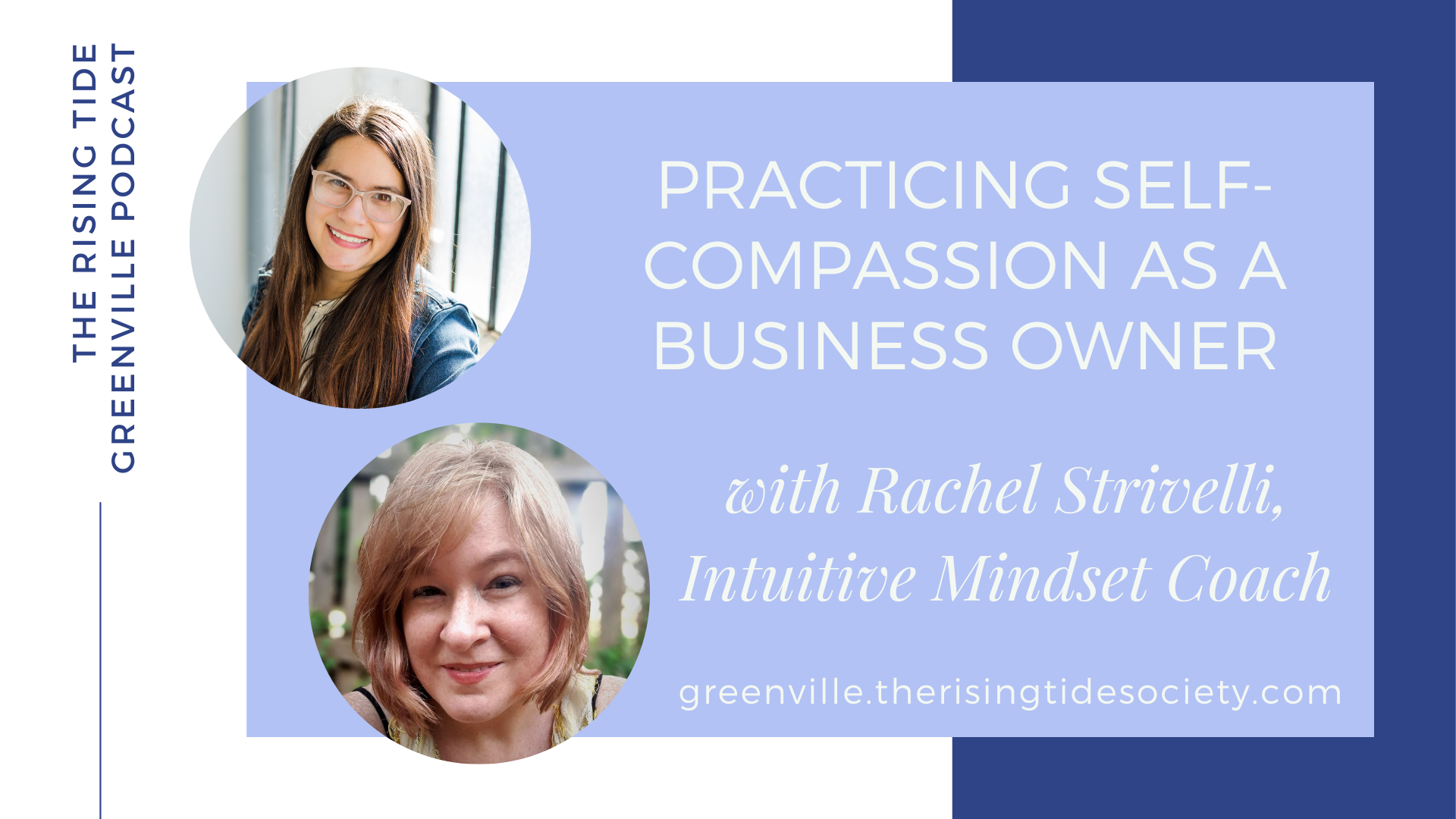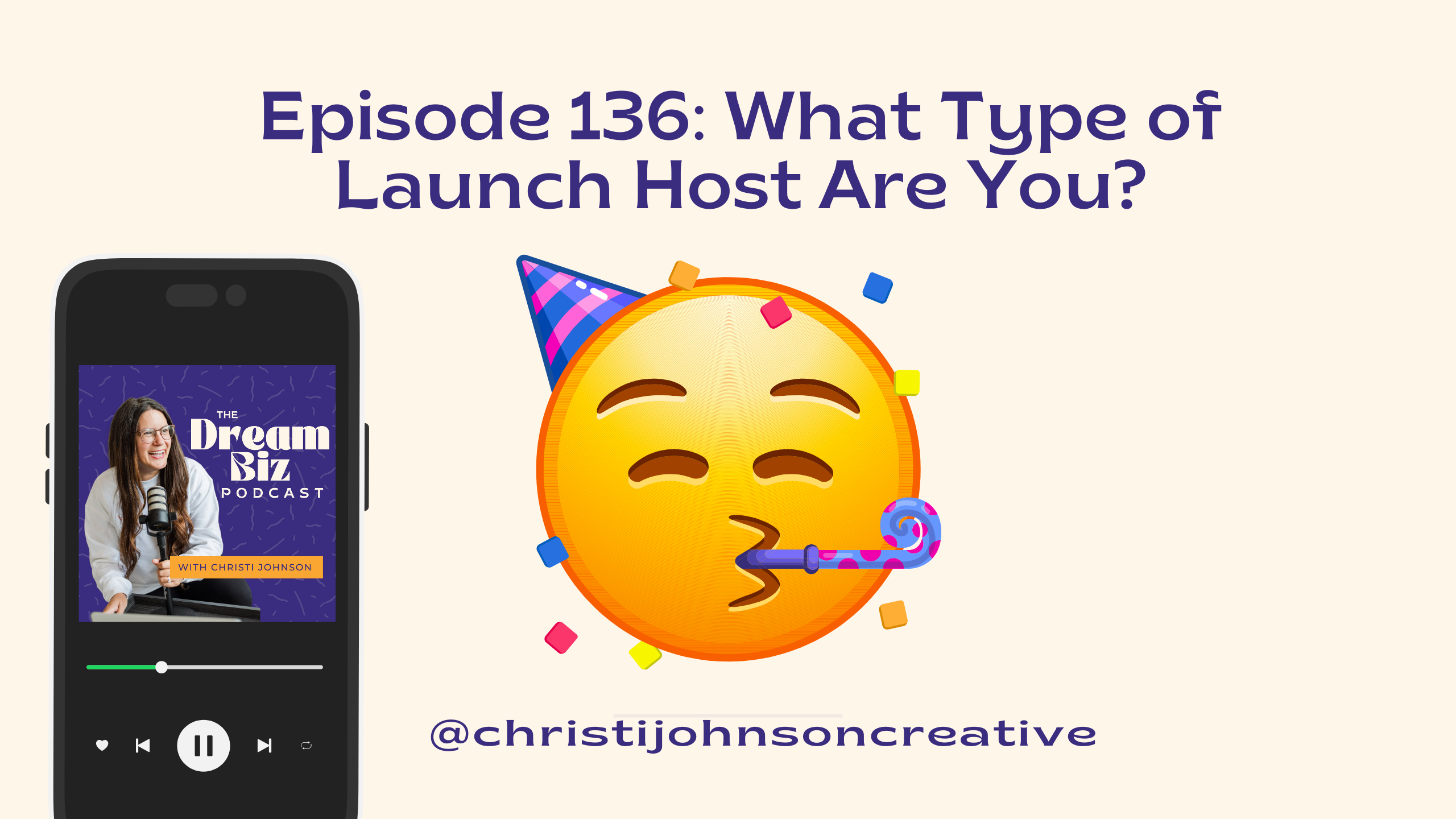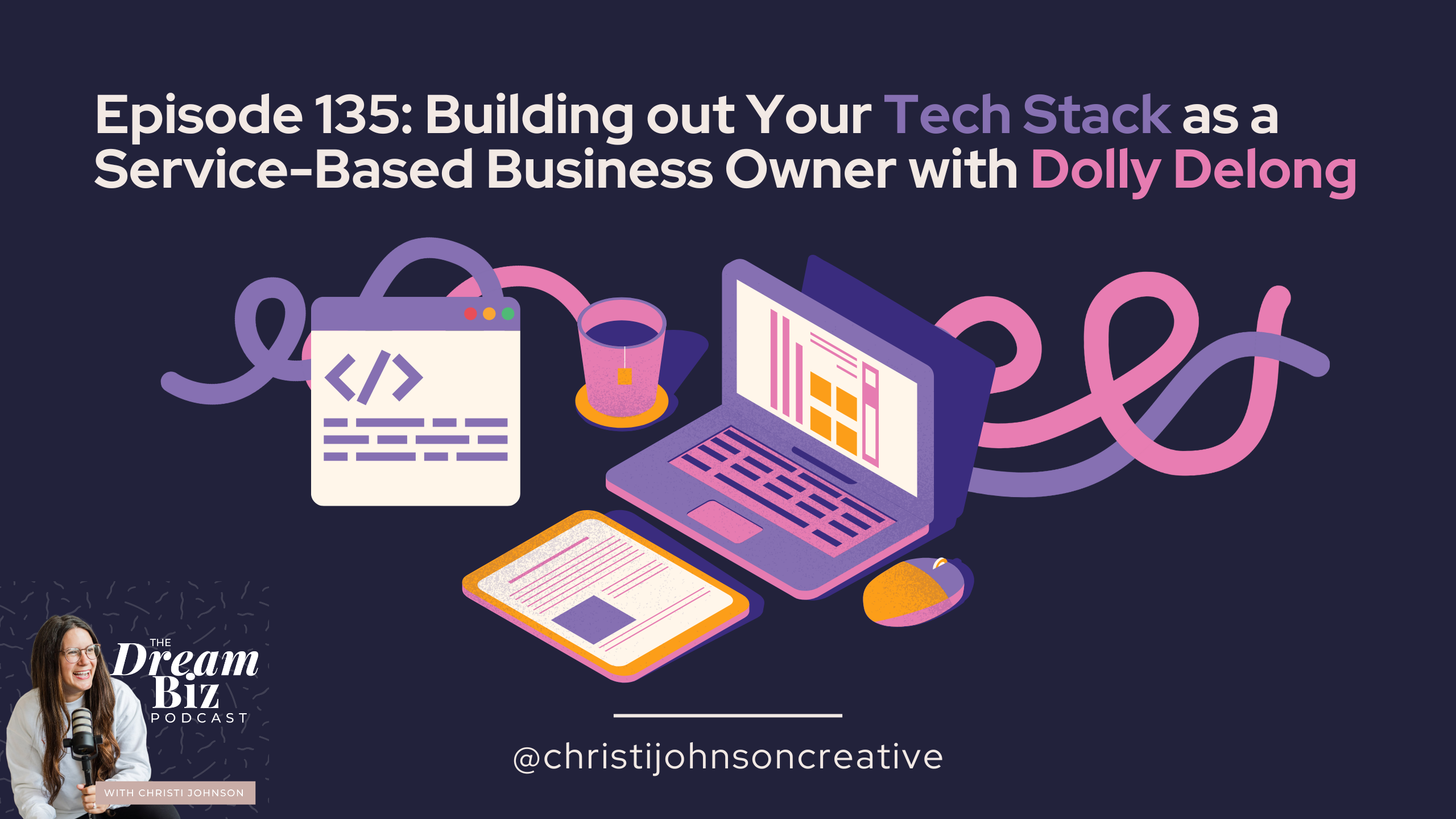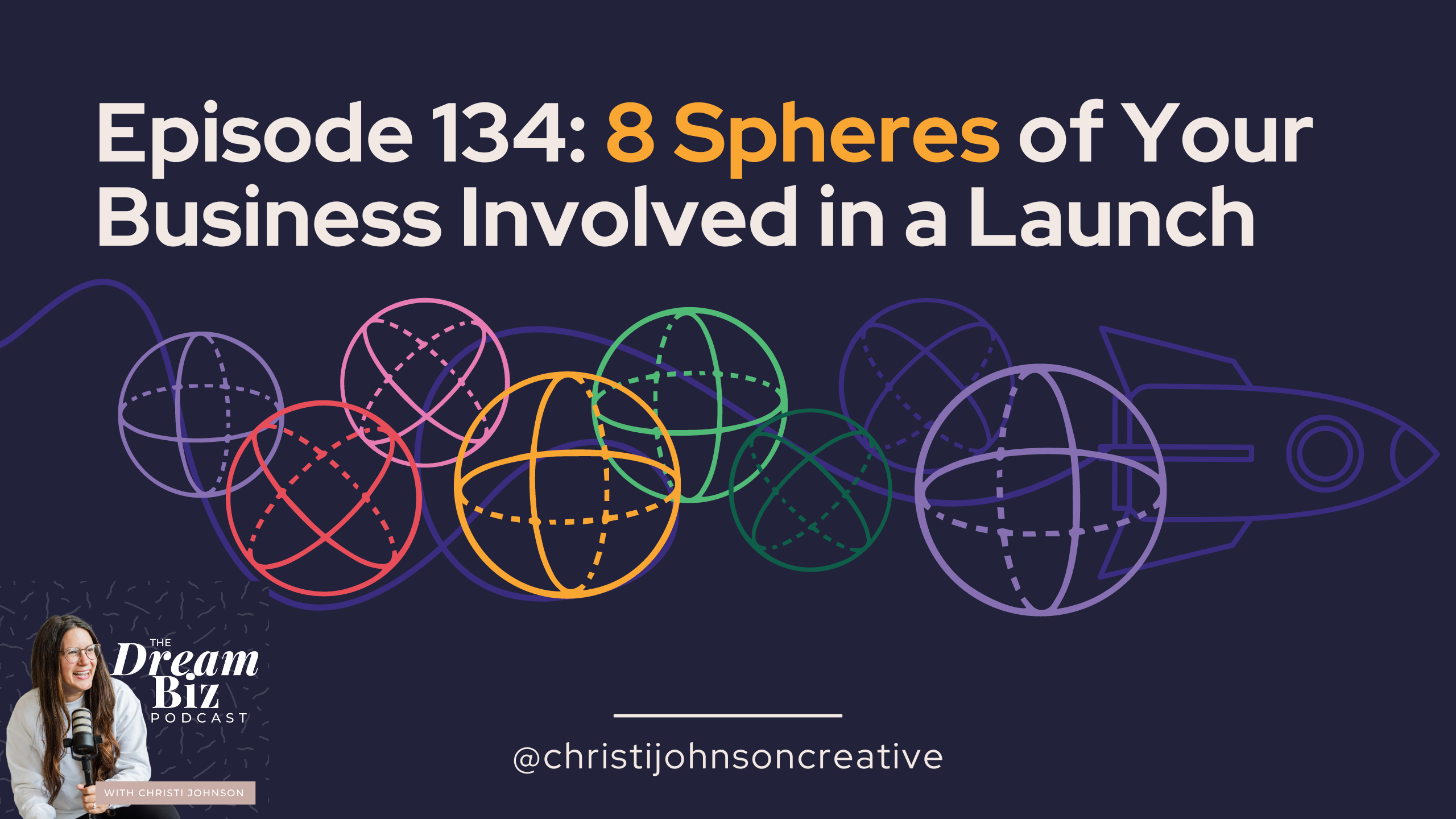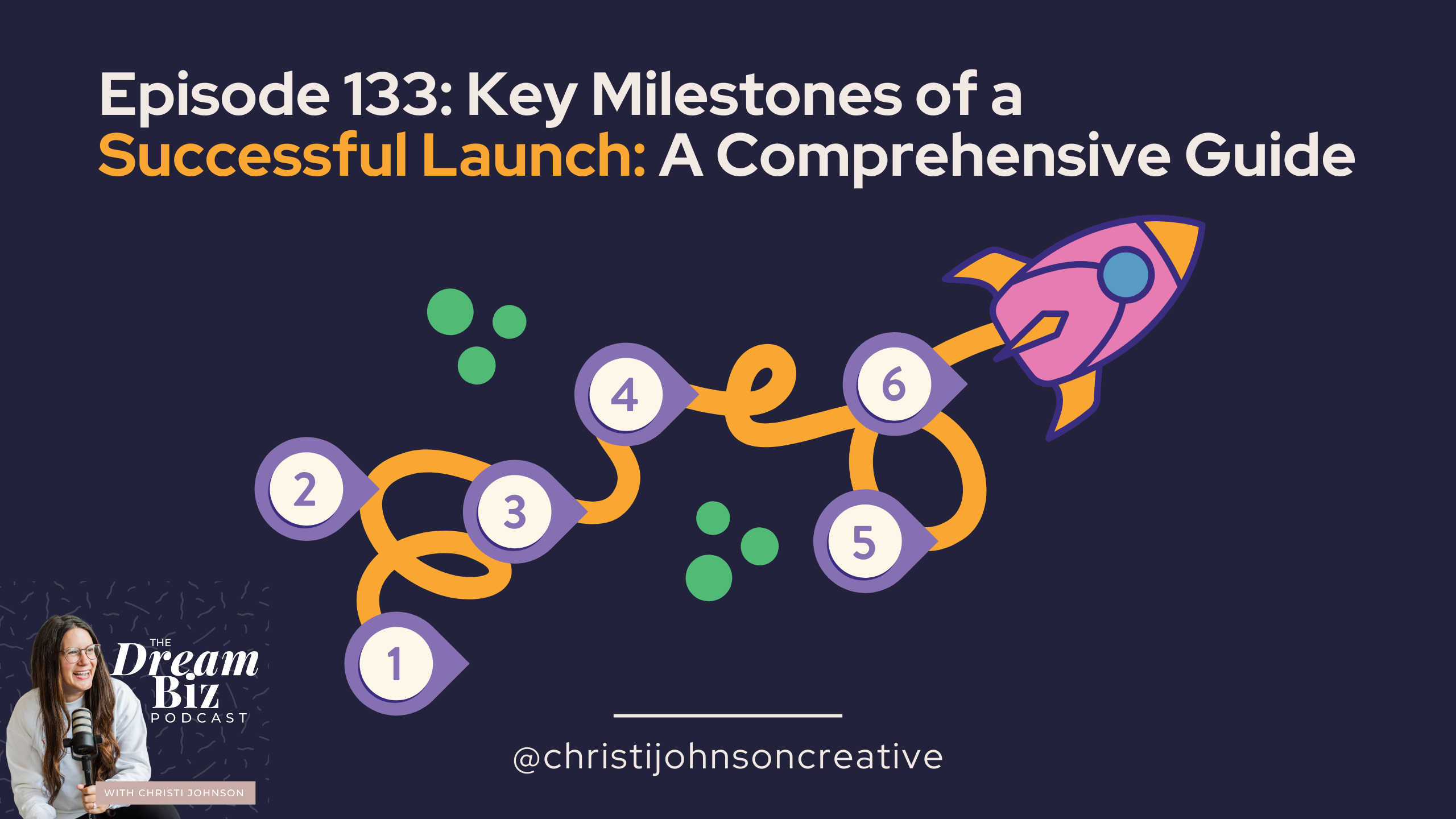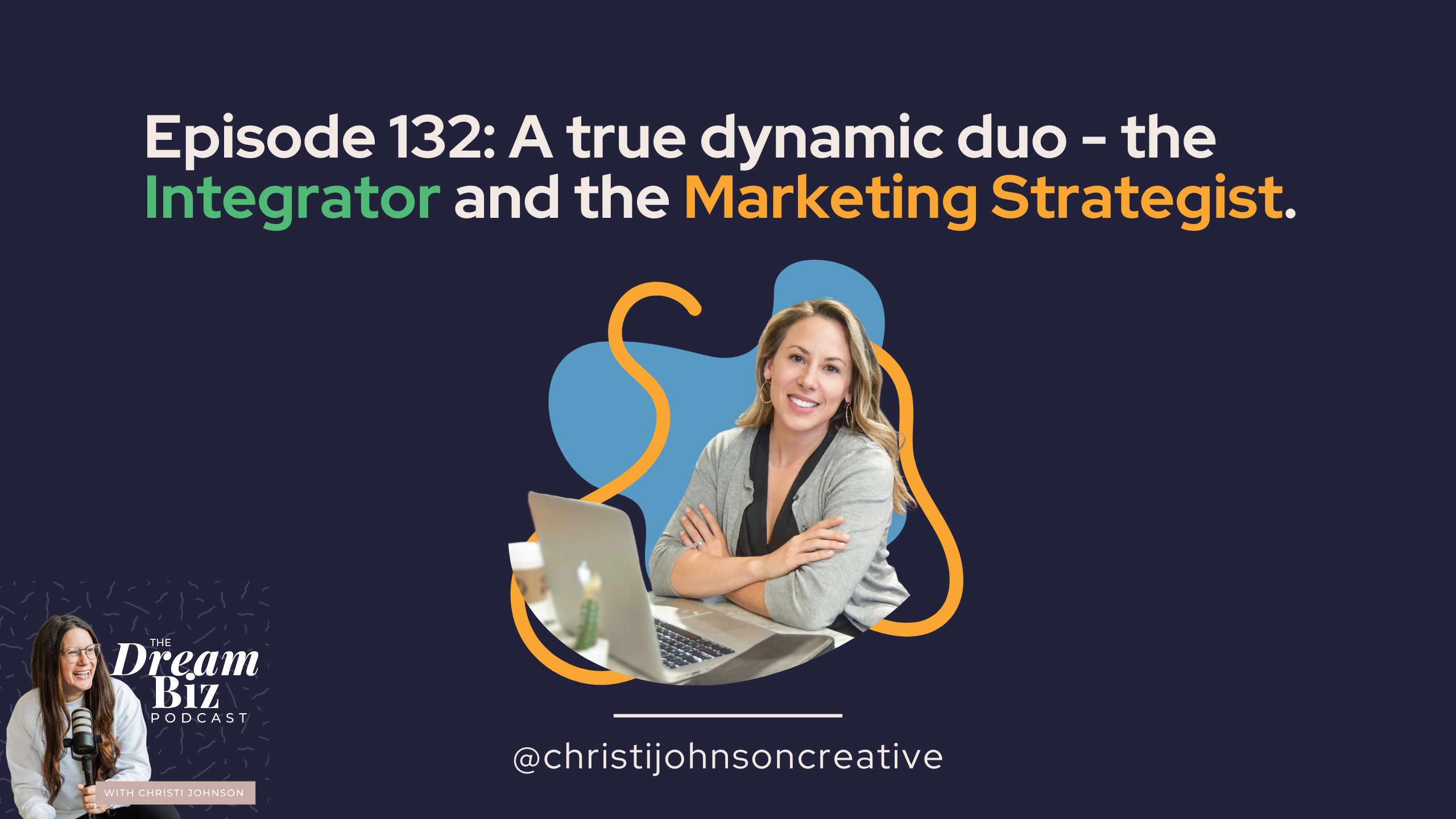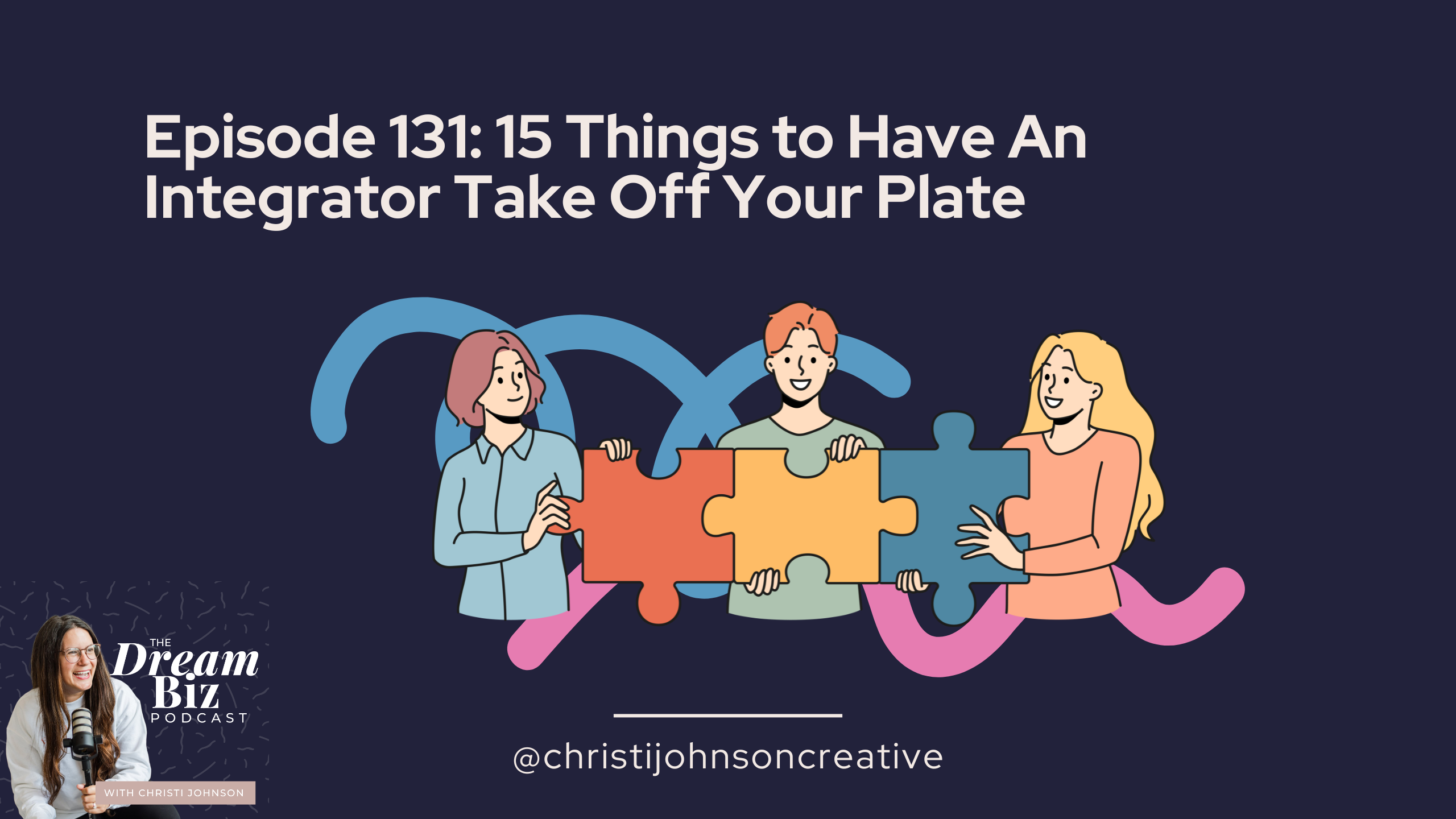Today I’m sharing an episode of the Rising Tide Greenville podcast! She talks to me about practicing self-compassion as a business owner!
Radical Self-Compassion as a Business Owner
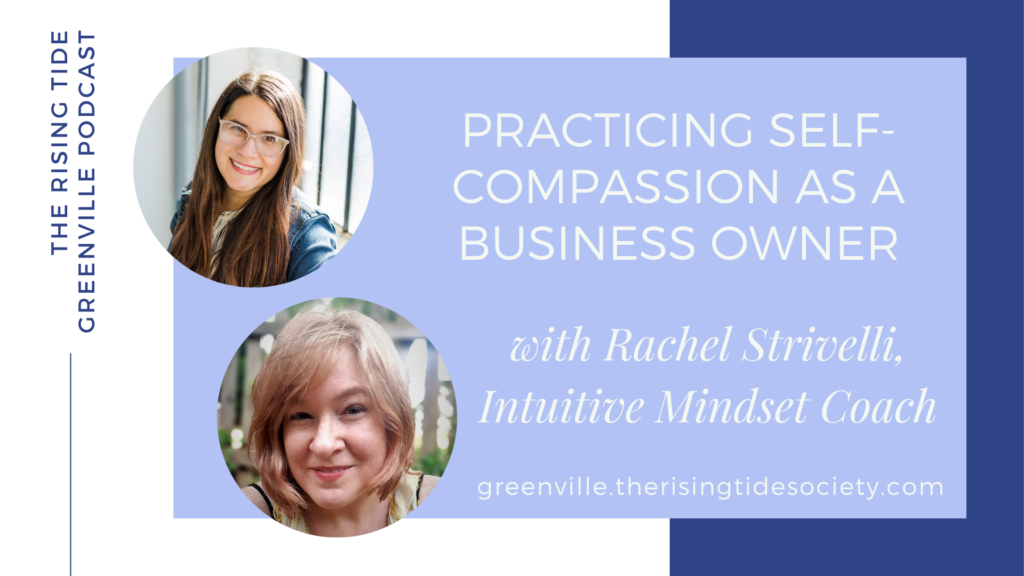
Transcript:
Christi Johnson (00:02):
Welcome to the Rising Tide Greenville podcast. We are the local chapter of the Rising Side Society. A community that exists to empower the creative economy and unite small business owners in the power of community over competition. We believe that you were built to belong that you’re not alone, and that there is power in community. I’m your host, Christi Johnson, the leader of Rising Tide Greenville, and every two weeks on this podcast, we spotlight a local small business owner in the upstate to share their story.
Joining me today is a Rachel Strivelli. Rachel is an intuitive mindset coach. She helps women step out of self-doubt and uncertainty and step into confidence and strong decision making through intuition. She empowers people with self trust and confidence, and I’m so excited to be talking with her today.
Rachel, thank you so much for joining me.
Rachel Strivell (01:00):
Thank you, Christi. It’s so good to be here.
Rachel’s Business Journey as an Intuitive Mindset Coach
Christi Johnson (01:03):
So I wanna hear a little bit about your business journey. I think that what you do is so interesting. I love that. You’re not just a mindset coach, but you’re an intuitive mindset coach. So tell us a little bit about what it means to be an intuitive mindset coach. What do you do and how do you help your clients?
Rachel Strivell (01:24):
Yes, I thank you. I would love to. So I created this title for myself after some trial and error. What it means to me is that you, when, I work with people one on one or in small groups, I bring my strong, intuitive senses to the conversation to help with transformation and empowerment. And I’m also a really logical person. I love neuroscience and learning and books.
And so I bring the strategy and the mindset part of it too. And I didn’t always have an interest in business. But I have always been interested in personal development and how the mind works and how we can use it. Since, since I was really young, when I was about eight or nine or 10, I was a little bit of a not troublesome child. Exactly. But <laugh>, I was always arguing with my parents and trying to find a loophole in what was going on.
Rachel Strivell (02:24):
<Laugh> yeah. And because I was smart, like I could come up with things to argue about, or I could find the scenario that they didn’t cover. And so one day my mom and I were in a conversation and she said, listen, you need to read this book. It’s the silver mind control method. And, and I was like, mind control. I was like, I do not wanna control other people’s minds, mom.
And my mom was said to me, no, Rachel, this is about you controlling your mind. And, and so that I was already an avid reader. But from then on all of the books that we had in the house, and we had quite a number of books like that, cuz my mom and dad were into that too. I just read all of these books, which are maybe written for adults and I was, you know, nine or a 10 year old and I couldn’t get enough of it.
Rachel Strivell (03:15):
So I’ve been interested in it for, since I was that age. When I went to school and college and all that. I went the route of becoming a teacher. I wasn’t really sure at that point in time, what I wanted to do. And I loved drawing out the potential and my students and helping motivate them when they didn’t wanna be there helping to try and find why is this lesson on irony or metaphor important in regular life? I always felt that was a fun challenge. However, after a few years, it, it didn’t have that same sparkle for me. I really am connected to nature and the earth. And I felt really called to be involved more in the environmental sciences. So I went to grad school for sustainable agriculture and specifically soil science.
Rachel Strivell (04:14):
And my plan there was I was gonna learn as much as I could about organic gardening and support farmers. Cause I had worked on a farm and I did not wanna do that for a living. <Laugh> it’s a hard life. Yeah. And there, my second year in grad school, I decided to take a business course. It wasn’t a part of my program, but I thought if I’m gonna support farmers, a farm is a business. I need to have a little bit of understanding of what they’re working with.
And honestly, the business class was my favorite class in all of grad school. I had no idea that business was so interesting. Yeah. Yeah. And I know some of you listening might think, well, it’s not that interesting to me. Just tell me what to do and I’ll do it. And, and I understand cuz there is a lot of information.
Rachel Strivell (05:05):
It can be very overwhelming, but with a lot of things, my approach is always start small. Start with the part of something that you’re interested in. You know, if you’re interested in the social media part of business or the marketing aspect, then learn more about that. And then talk to other people who know more about the other aspects. Hire help where you can’t figure it out yourself. And lean into what are the parts of it that interest you. Not every part of business interests me, but a lot of them do. Right?
And, and so that, that sparked this interest in business for me. And for the next couple of years I worked for nonprofits. Then I went back to teach public school again, but I kept on it. It was like something was woken up in me of, oh, business is an option.
Rachel Strivell (05:53):
And I would look at businesses around me and strategize, oh, this business is struggling. How could I help them if I was gonna consult with them? What could I do? And so I started freelancing, helping some businesses in my field of sustainable agriculture. At the same time, I also started doing garden coaching. So I coach people on how to grow an organic garden.
And that, that was where I launched my first official business. It’s different now obviously a garden coach is not the same as an intuitive mindset coach, but I kept on following my own intuitions of this is the next thing that I’m curious about. This is what I feel like is true to me.
And I feel that if you’re gonna have a business, that one, it, you want it to make money because then it’s successful. And two, my attitude is why not have it be something that fits with my life and my interest because I’m gonna be spending a lot of time doing this. Yeah. So why not build it to be something that fulfills me and interests me?
Business is Not a Straight Path
Christi Johnson (07:04):
I, I love that. One thing that I’ve loved about this entire podcast that I’ve been doing, I think your episode number seven, everyone who has shared their journey, it hasn’t been, you know, a straight, well, this is what I wanted to do. And I went out and I achieved that it’s been a journey for everyone. So often as a small business owner, we can sometimes feel, at least for me as a multi passionate person, I can feel like my journey doesn’t make sense.
You know, I started out as a a swim coach and a photographer and those two things didn’t go together. And I was also really into music and went to grad school for, for piano <laugh>. And I think a lot of times we don’t trust ourselves because mm-hmm <affirmative> whether maybe society has conditioned us into thinking that we have to, you know, have this one path laid out in front of us and, and stick to that and, you know make sure that our, our journey makes sense, but that’s not how it’s been for me.
Christi Johnson (08:12):
And I, and it doesn’t sound like it’s been you know, the, an exact straight line for you. Maybe there’s been branches that have branched off and led you to other things, but I love what you said. You said that you just kept on following your own intuitions mm-hmm <affirmative> and I think that’s so important. So tell me a little bit more about intuition and how you help your clients kind of lean into their intuition and have a more abundant mindset. Can you tell me a little bit more about, about intuition and mindset?
Intuition & Mindset in Business
Rachel Strivell (08:47):
Yes, I would love to, and I should clarify people don’t always come to me and say, I wanna work on my mindset. I wanna work, work on my intuition. That’s how I’m defining what we’re doing and, and I’ll share with y’all what it will look like maybe to you be. But that’s, I guess the most simple way that I can describe it. So yeah, when I think about mindset, I think about the self-talk that happens in your head and sometimes also there’s emotions that are making that self-talk happen.
So if you have a bad day, you’re probably having self-talk, that’s a little bit more negative, unless you’re used to motivating yourself with your self-talk mm-hmm <affirmative> and if you’re having a good day, it might be one of those days where you’re saying to yourself, oh, I’m doing so great. I’m rocking this. I aced that experience.
Rachel Strivell (09:35):
I aced that pitch to the client or the networking event or whatever I did. I, I finished my project by the deadline. So in those moments, you’re having the positive self talk and in, and what is the place where I come in a lot is where there’s something new, perhaps that you wanna do that you’re reaching out, into expanding out into, or you think I wanna get to this next level, but you don’t yet know how you’re gonna do that.
And it’s very easy for the self talk to get a little bit negative and defeating and because, and, and some of this is just biological. Our brains don’t really want to do things that we haven’t done before, because they wanna survive. The brain is like let’s, let’s get Rachel and Christie and the whole audience to survive. And the best way to do that is the safest least risky option possible.
Rachel Strivell (10:32):
However, that’s not always what makes us super excited. <Laugh> I could be safe in a very boring room with no art <laugh>, but I’m not gonna like being there for very long. And so the intuitive side of it is we all have these natural inclinations, these, these tendencies, you know, you’re really drawn to swimming. I’m really drawn to playing in the dirt, digging in the dirt.
These are things that maybe have been with us since we were really little and, and over time we find ways to bring them into our life more or less. And when we follow these natural inclinations, these intuitions, I feel like it’s our way of, of really responding to what is my body and, and my soul. That’s how I think of it as well. What is my soul desiring and how can I listen to it? And the, the other thing, so researchers will talk about are our logical brains, that process information.
Rachel Strivell (11:36):
There’s so much data and stimulus that come at us every day. Mm-Hmm <affirmative>, even if we didn’t live in, you know, the techy world with all the ads and dings and pings and notifications and news and all that, even a hundred years ago, still there’s constant stimulus coming to you and your brain has to decide what’s important, what’s relevant. And what do I ignore? And the, the biological part of the brain that figures that out is called the particular activating system.
So it’s what filters in the information that you receive that you’re consciously aware of. But even if you’re not conscious of it, it’s still coming in. And in studies where researchers try to figure out are people aware of things before their conscious mind is aware of it. And they do this by sometimes hooking lie detector machines up to people while they have them go through various simulations or looking at their heart rate or stress level, or how much they’re sweating and things like that.
Rachel Strivell (12:35):
And what they found was the body will pick up on changes or dangers or risks mm-hmm <affirmative> well, before the mind does. And so the, in two, the intuitive part of us though, like, let’s say, you and I are interacting with somebody, and we’re trying to decide, is this gonna be a new business associate, or are we gonna hire this person for something? Well, your intuition is when you get the gut feeling that says, either they look great on paper, but something is off.
And I can’t put my finger on it. Mm-Hmm <affirmative>. And I work with people to say, okay, listen to that. If you feel it’s off, then it’s off and move on it. You don’t have to have the data, the logical rational reason. Why? Because a lot of times what happens is if you ignore that something is off feeling, you later receive information from experience, why something was off that you didn’t know before, but your body, your intuition was trying to tell you.
Christi Johnson (13:40):
Yeah, I, I think we can get that sense. So often whether it’s, like you mentioned finding someone that we wanna go into business with, or work on a project with, or even in our own work day to day, I think sometimes we can get the sense, you know, this is, this isn’t really what I wanna be doing. But again, I talked about, you know, societal pressures.
I think sometimes we, we fall into the trap of, of believing that we need to, you know, stick something out, even if we don’t feel right, because that’s what other people are telling us to do. Instead of listening to your gut feeling and saying, you know what, this just isn’t, this just isn’t jiving with me. <Laugh> and, or, or maybe working on something and, and finding, you know, when we get into a sense of flow and we’re working on things and it’s working really, really well, and we’re all fired up. One thing that I love to do is say, how can I find more of that work? That gets me really excited, that I’m really passionate and kind of follow that intuition, I guess, is what is what it would be.
Rachel Strivell (14:46):
Yes, definitely. And some of it, I think is as simple as noticing, like you’re saying, and, and reflecting and evaluating and responding to that. Mm. So I have a, a program I created called nourish your nourish with nature, or nourish your soul with nature. And it’s all about sitting outside and taking time to observe and reflect, and it calms you down.
But also what it does, which all of us creatives need is you start noticing details and you train yourself to observe, because I think one of the most important qualities, if you wanna develop your intuition is you have to have some quiet time where you can just be, and then reflect, because if you’re always responding constantly, if you’re always moving all the time, if there’s always noise and sound, I mean, I love podcasts, the people listening do too, but there, I’m hoping you can have five minutes a day where there’s not things bombarding you where you can just sit and be with your thoughts.
Rachel Strivell (15:52):
So you can have that moment to think, okay, today when I was working on this project, I felt like this one thing was off. Maybe I need to go back and look at that again. Or maybe, you know, I was really in the flow. How can I make more of that happen, creating the time to pause and reflect and respond to how you are feeling about a situation it’s really empowering.
And it really does build you up to trust yourself. And, you know, in society like you were saying, we get these messages. Some of it, I don’t think as a parent. So I have two children. And, and as a parent, I’m I always feel the push pull of, I gotta keep the household running, but I want their, their spirits to still be able to express. I want them to be allowed to be creative children.
Rachel Strivell (16:41):
And so there, there’s definitely a push pull there. And, and I also think as adults, some of the time, I feel maybe we’re just reawakening the child in us again and saying, it’s okay, you’re important. How you feel is, is, is valid. Let’s notice how you’re feeling, notice what you’re thinking about and lean into that a little bit more. And it, it doesn’t always mean that there’s a reason why you can say that something happened or a rational, well, those, the stock market says that these numbers and this and that, like, there are all these things that could, you could use to rack up and say, I should do this thing, or I shouldn’t. But the bottom line is how do you assess this situation? And what do you feel is the best for you?
Getting Out in Nature to Reset
Christi Johnson (17:32):
Right? And so often we don’t take the time to notice, or when we do notice a feeling or a thought, we kind of shove it to the side and say, well, I don’t have time to deal with that right now. Mm-Hmm, <affirmative> at least for me, I know that I tend to avoid things because I know that it’s gonna take time to really dig down deep and figure out, okay, what’s going on here. And maybe I let my to-do list become more important than taking the time to really nourish my soul.
Like you said, mm-hmm <affirmative> and then if you continually develop a, a habit of that and a pattern, then I think it gets harder and harder to take that time, to really spend with yourself and notice and observe, like you said, and take time. And you know, we’re so connected to our devices and to our schedules, especially with kids, there’s things that you’ve got to do all the time.
Just going to the next thing, going to the next thing. So how do you think someone can maybe stop themselves from avoiding those thoughts when they come up? You know, thinking, oh, I really need to deal with this, but I don’t have time, so I’m gonna avoid it. Right. How can people start to develop into their lives, a pattern and a habit of taking time, getting out with nature and observing and slowing down and listening to their souls.
Rachel Strivell (19:05):
Mm-Hmm <affirmative> yes. And so nature’s my big thing. Well, I mean, it’s all our thing. Yeah. <Laugh> luckily, but if it’s not, if nature’s not your thing, then you can do this another ways. I just wanna share that. So one thing you could start with is find a time once a week.
So you don’t have to start with every day, because I know sometimes that’s not reasonable once a week, where you can take 15 or 20 minutes where you’re gonna reflect on your week. Even if you do it just once a week, you’re gonna be well above people who never do it at all.
A couple years back when I first started coaching and I wanted, so I didn’t do a certification program. I’m fair. He driven. And I mean, I’ve read enough books. I probably have my own masters in psychology, pretty much cause of the number of books that I’ve read, but, and the conversations I’ve had and all of the programs I’ve gone through.
Rachel Strivell (20:06):
So I, I was learning and developing my own way of coaching myself in real time with the first number of clients that I had. And I realized pretty quickly into it that if I wasn’t ever stopping to reflect what happened in the coaching session, what I thought of it, how I could improve, then, then I was missing out on a learning opportunity.
And this probably comes from my teaching days too, of the way your brain’s really solidified learning and put it in your long term memory. Is that, that reflection time, that evaluation time, because otherwise you’re just working with like the surface levels of understanding something or getting into a topic. So what I started doing was after every session I would, I, I made myself a form and I would fill out three questions. What went well, what didn’t go, well, what do I wanna do next time?
Rachel Strivell (21:02):
And it, I mean, maybe it took me one minute after every session. I feel that that was one of the things I probably became 25% better just from doing that. And it wa I didn’t even have an expert coming in and telling me it was just my own time to pause and reflect. And so if you can do this for yourself every day, that would be amazing.
But if you can’t, like I said, at the end of the work week, it’s a great time. Yeah. Some people also like to add it on to when you look at your financial numbers. Yeah. Because you’re already in that reflective, evaluating phase and you’re already going through the same kinds of questions. Yeah. That’s a great idea. Yeah. So that is something super easy, super tangible. Like I it’s free. I also think working with someone like me or someone else, one to one, and in a, in a, or in a group is really helpful.
Rachel Strivell (22:03):
Some of the time people come to me because like you were saying, there’s something maybe that people are avoiding. Hmm. Well, you know, you can’t avoid it if you’ve made an appointment and you have to show up and you have to talk about it. <Laugh> and, and a good coach, which I believe I am. And I know there’s other good ones out there too will sense if you’re avoiding something.
Or if you told me you wanted to come on the call and talk about being visible, let’s say, on social media or dealing with your inner critic or overwhelm, but then you spend 10 minutes talking about everything else. We’re gonna get back to why you said you were there, why you wanted to work on it. So sometimes that extra person can make you accountable and really help you break through that resistance.
Once you have broken through the resistance, what I think is really amazing is I try to be really compassionate with myself in the various things that come up in life and business. And, and when I work with people I’m compassionate to, and it, even the things that I’m avoiding or ignoring, or the things that my clients are avoiding or ignoring when we can be compassionate and, and, and take the time to reflect and be quiet and look at the thing, talk about it, deal with it. It’s not usually as scary or overwhelming as the accrued energy and emotion of resisting and ignoring it for weeks on end over and over and over again.
Practicing Self-Compassion in Business
Christi Johnson (23:45):
Yeah. I love the idea of, of compassionate being compassionate with yourself, and I want to talk about that more. But I do wanna go back to something that you said a little bit earlier about getting with nature and how it doesn’t, if nature’s not your thing, it doesn’t have to be your thing. I totally agree with that, but I also wanna share a story. So I lived in California for, for two years from 2018 to 2020.
And one of the people that I met there had also moved to California. California is a place there’s a lot of transient people. You know, a lot of people move for a job or they move for a season and then come back and this person had moved from Pennsylvania. I think, I don’t know. And he said that he wasn’t really a nature person, but in California, there’s so much incredible, beautiful nature all around us.
Christi Johnson (24:41):
So a lot of our friends were just getting out in nature all the time, going on camping trips, going snowboarding, you know, all kinds of things. And he said, you know, I used to think that I just, wasn’t a nature guy, but I’ve been doing these outdoor things with you guys for a while. I’m realizing, I think I am. I think I just didn’t know. I just never took the time to spend in nature. And I really believe that there, there are healing properties to being out in nature. And I love how you said that it doesn’t have to be something that you do every single day. You can start small. You couldn’t start with once a week.
And I would encourage people to, to take that step to get out. And you might be like, I’m going outside for five minutes. This is weird. What am I gonna do? <Laugh>. And like that first time might be a little bit awkward and you’re like, what am I supposed to do? Look at this leaf. And I don’t know <laugh>, but over time you might, you know, start to notice things and see how that, how that can help you. I know that was a little bit of a tangent, but I wanted to, to share that story that starting small really can help. And, and I, I love nature so much.
Rachel Strivell (25:49):
<Laugh>. Yeah. And, and, you know, I, I have to stop myself from talking about nature. Like I’m a ambassador or something for it. Yeah. Because that’s how passionate I am. And so I don’t feel that it was a tangent. It, I felt like it was perfect. And the other thing I will add that relates to compassion and self acceptances.
When I have had some of my most difficult moments in life of people passing away or a job loss or various other things that were radically making me sad when the pandemic hit mm-hmm <affirmative> I will go out and spend time in nature.
And I feel there’s definitely physiologically things happening. I’m getting breathing in the fresh air. I’m sitting on the ground, I’m feeling all of that, that happens. And there are other things happening too, that just bring me back to a place of peace and calm and wonder.
Rachel Strivell (26:44):
I, I love how, yeah, California has so many great landscapes that are just easy to engage with and think, wow, the world is an amazing place. And so if you are going through a challenging time or you do feel that you’re very self critical, I do find that nature’s a place, try it out. Like, like this kind did try out five minutes a day and see, do you feel a little bit calmer? Do you feel more compassionate with yourself?
Cause what I like about the outdoors is the trees aren’t worried about. Am I growing fast enough? Yeah. Do I look as good as the tree next door? <Laugh>, you know, am I blooming to my maximum capacity? Yeah. The trees are just doing their thing and, and I look at them and I get all philosophical and then I feel better. And I think, okay, maybe I’ll just do my thing. I’ll grow at my own pace. And it’s cool.
Christi Johnson (27:39):
Yeah. I love that so much. And you talked about compassion and self-acceptance and that’s something that I’ve heard you talk about before is the idea of radical self-acceptance. In our last few minutes, I would love to hear you tell me just a little bit about what it means to be radically self-accepting
Rachel Strivell (28:00):
Mm-Hmm <affirmative> so I encourage almost everyone I know, to be so accepting and loving of yourself that you’re almost embarrassed by how much you think you’re great. And, and I’ve, I’ve come across people before who say, oh, but I don’t know, am I gonna turn into a narcissist? I don’t really think that’s gonna happen. One, like, I don’t know how one turns into one, but I don’t think that’s how it happens.
But we’re so used to, there’s a lot of ways that it’s easy to compare yourself to others and to stop feeling like you’re amazing, but it, whether you watch a feel good movie or you read an inspirational post, or you go for a walk and you see an amazing sunset or, or play with your dog and your dog, super fun, those moments where you can remember, Hey, life is good.
Rachel Strivell (28:58):
Yeah. Maybe not every single thing is good. Obviously there we got, we we’re empowering other people, but compared to not being alive is pretty good to be here. And so I really try and find as many occasions to lean into the joy of life, the pleasures of life, and to accept that my own tendencies, my own behaviors, quirks. It’s not that I think everything I do is a hundred percent perfect. Mm-Hmm <affirmative>, but it’s more, I’m going to be as kind of myself as I would to my child or to my friend.
And I’m gonna return to that again and again and again, and I, as much as possible, I have like a no criticism of my self policy. Now some thoughts will still creep in, but as soon as I notice them, then I think, okay, okay. Nope, Nope, Nope. That’s that’s critical. Oh, I didn’t do enough for the holiday season this year.
Rachel Strivell (29:58):
Well, who cares? Yeah. And I, and I just find a way to break the pattern because if we each had someone cheering us on all of the time and encouraging us to, to blossom and to grow, I think we have more potential to blossom and grow to feel really good about ourselves. And that’s, you know, that’s one of the things I love about Tuesdays together is because whenever I’ve gone to a meeting, it feels that people care.
Yeah. And it’s just so nice to show up in a place or listen to a podcast where you feel that there’s this sense of community and, and positivity and building each other up and empowering. And like I said, I don’t have any illusions that everything is a hundred percent perfect as it should be in the world. I, I wanna work to improve things, but I also think if I can be what feels like 125% radically accepting of myself, it’s probably actually only like 80%.
Rachel Strivell (31:06):
Right. Cause there’s still things happening and moments that where I realize, oh, I really messed up that situation, but it’s that pouring into yourself of love. And there, I I’ve been thinking lately, there’s this phrase that people use in business where you, where they say there’s, it’s the no like, and trust factor that people hire you.
If they know you, if they like you and if they trust you and I’ve really been thinking a lot lately about how, and it starts with you having the know like, and trust factor with yourself, right. You gotta know yourself, know what your tendencies are. I know I’m not, I’m a early riser. I like to work early in the day. Like I, I try and work to my strengths and acknowledge my weaknesses. I like myself. Are there things I could do differently? Or like more, yeah. Maybe, but you know, I’m just gonna pour the love into myself. And then I trust myself. I trust that if I feel that something is worth spending my time on or good decision, then I’m gonna go with that for as long as I can until I receive intuition or information otherwise.
Christi Johnson (32:18):
Yeah. And, and cheering yourself on sounds so strange to think about, but it’s so important just like having a great coach or a teacher, we can all think of the times where we’ve had a good coach versus a bad coach, you know, on childhood sports team or whatever. Right. A good coach is someone who loves their, you know, their students or, or players or whatever, and is so on their team like that.
They want what’s best for you. They’re gonna do everything they can to make you feel like you are good enough to make that basket or, you know, reduce your time on your, you know, swim or whatever. So often we don’t take those concepts into our personal, you know, personal growth and personal development, but it, it really is the same concept. And you can love yourself enough in the same way to, to have your best interest at, at heart instead of self sabotaging, you really can work to yourselves advantage. It sounds like that people can learn that skill over time
Rachel Strivell (33:27):
Definitely.
Christi Johnson (33:28):
And one way that they can do it is by working with you. I have really enjoyed talking with you. This, this has been such an amazing conversation. I feel like we could go for another 30 minutes <laugh> but I do want to we’re out of time, so we have to wrap it up, but I just want to just encourage people that they can do it and they can learn this concept. And one of the ways that they can do it is by working with you. So can you tell people where they can find you online and how they can work with you?
Rachel Strivell (34:01):
Yes. So I’m at rachelstrivelli.com. And I mentioned before I have a nurse with nature program that you can sign up for. That’ll help you get out into nature and practice some peace and calm and self acceptance. I also recently created a seven day free course that you get in your inbox. That’s all about doodling and manifesting. And it’s really playful. Because I like color; I like playing; I like kind of silly things. And so I think it’s pretty fun and both of, so that that’s totally free. And then I work one on one with people and on my website, you can book a call and you can always book a free session just to talk to me because it’s nice to go over. Oh, here’s what I’m working with. Can you help me with that before you commit to something
Christi Johnson (34:56):
Great. So rachelstrivelli.com and people can also find you on Instagram @rachelstrivelli
Rachel Strivell (35:01):
And YouTube.
Christi Johnson (35:03):
Okay. YouTube. Yeah. Rachel is awesome at YouTube. So check her out. Thank you so much for being here with me on the podcast.
Rachel Strivell (35:11):
Thank you. This was a pleasure.
Christi Johnson (35:13):
Awesome. So if you guys want to learn more about Tuesdays together, you can visit us online@greenvilledottherisingtidesociety.com. You can find information about our local meetups as well as our monthly guides about different business topics. We would love to have you like Rachel said, we’re a supportive community. We care about you and we want you to experience self acceptance. So come and join us. Greenville dot the rising tide society.com. Thanks for listening. We’ll see you next time.
Listen to more episodes at christijohnsoncreative.com/podcast
